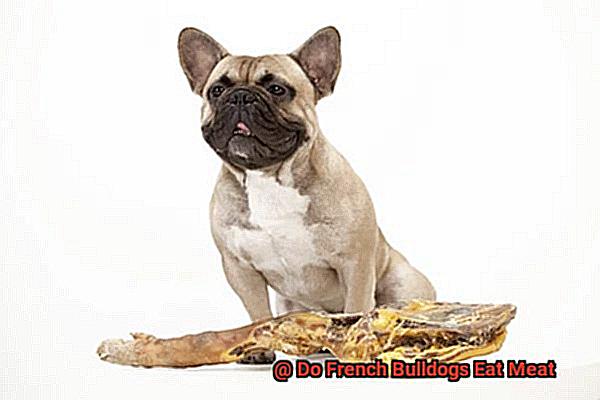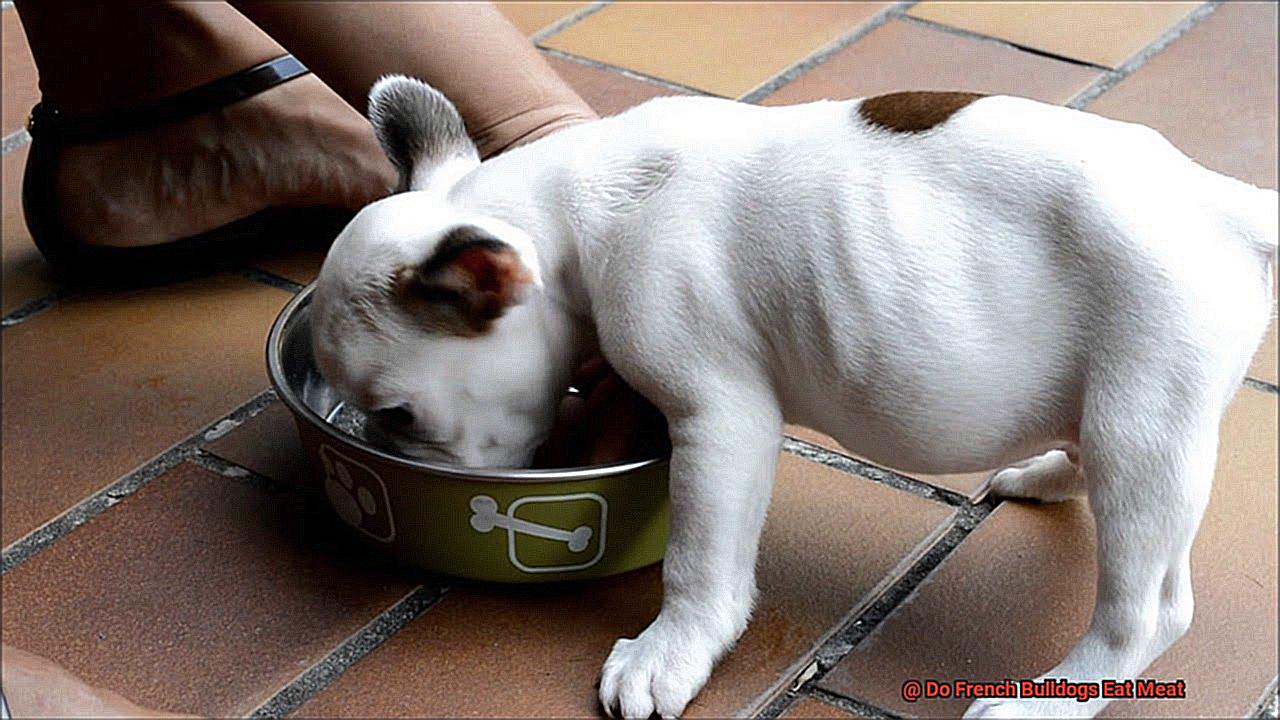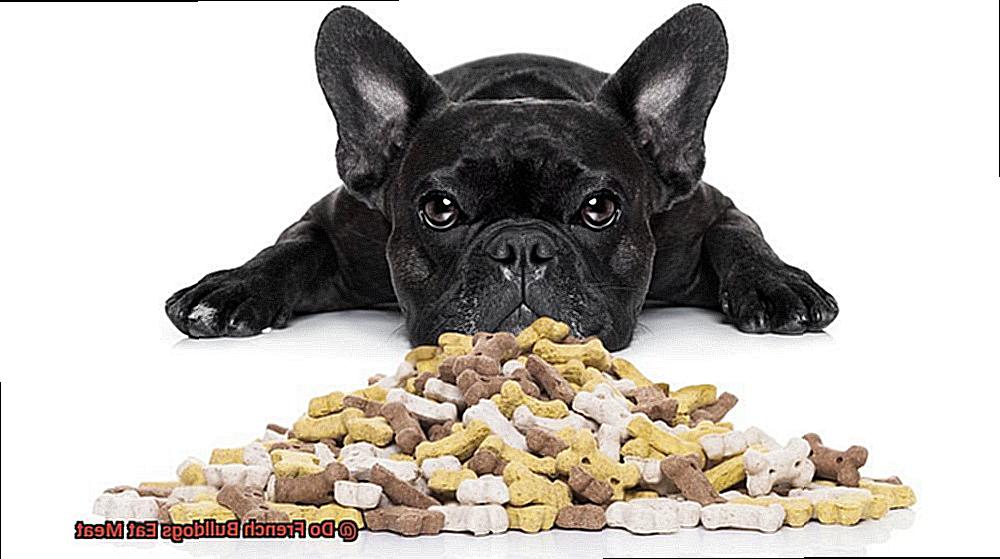Do French Bulldogs Eat Meat?
Today, we’re embarking on a lip-smacking adventure into the world of French Bulldogs’ eating habits. These pint-sized yet oh-so-charming canines have stolen our hearts with their cuddly nature and unique looks. But amidst all the puppy snuggles and squishy faces, one question lingers in our minds: do French Bulldogs have an unquenchable thirst for meat?
Sure, they may seem like sweet little fluffballs, but let’s not forget that their ancestors were mighty wolves – fierce hunters with a taste for flesh. As time passed and dogs evolved into different breeds, their dietary preferences changed too. So, join us as we uncover whether French Bulldogs still have a hankering for meat in this modern age.
To settle this meaty debate once and for all, we’ll dive deep into their genetic makeup, historical context, and nutritional needs. From their wild roots to their domestication journey, we’ll provide you with all the juicy details to help you make informed choices about your furry friend’s diet.
So grab yourself a cup of tea or coffee (or maybe even a tasty treat for your French Bulldog), and let’s explore the captivating world of these pups’ culinary inclinations. With our hunger for knowledge driving us forward, we’ll satisfy our appetite by uncovering whether our beloved Frenchies are true carnivores or not.
The Carnivorous Ancestry of French Bulldogs
Contents
- 1 The Carnivorous Ancestry of French Bulldogs
- 2 Nutritional Benefits of Meat for French Bulldogs
- 3 What Types of Meat Should Be Fed to French Bulldogs?
- 4 Other Food Sources for a Balanced Diet for French Bulldogs
- 5 Special Dietary Requirements and Allergies in French Bulldogs
- 6 The Role of Veterinary Advice in Feeding Your French Bulldog
- 7 The Importance of Protein-Rich Meals for Optimal Health in French Bulldogs
- 8 How to Monitor Your Dog’s Dietary Habits
- 9 Conclusion
In this article, we will delve into the carnivorous roots of French Bulldogs and explore why meat is an essential component of their diet.
The Carnivorous Ancestry:
French Bulldogs, like all dogs, trace their lineage back to wolves, which are carnivorous creatures. Wolves primarily feed on meat, and over thousands of years of evolution, they have developed specialized teeth, jaws, and digestive systems to efficiently process and derive nutrients from animal protein.
Retaining Genetic Traits:
Despite the domestication process, French Bulldogs still retain many of the genetic traits of their carnivorous ancestors. Their sharp teeth are designed for tearing and chewing meat, while their strong jaws enable them to consume and digest it effectively. Moreover, their digestive system is optimized for breaking down animal protein and absorbing its valuable nutrients.
The Importance of Animal Protein:
Animal protein plays a vital role in a French Bulldog’s diet. It provides essential amino acids that cannot be synthesized by their bodies, supporting muscle development, repair, and overall growth. Additionally, protein contributes to healthy skin and coat condition, ensuring your furry friend looks as dapper as ever.
Balanced Nutrition:
While French Bulldogs can survive on a diet that includes plant-based ingredients, it is crucial to provide them with a balanced and nutritious diet that includes a significant portion of animal protein. A well-rounded meal plan ensures they receive all the essential nutrients they need to thrive.
Raw Food Diets:
Some dog owners opt for a raw food diet for their French Bulldogs to mimic the natural diet of their carnivorous ancestors. This may include raw meat, bones, organs, and other animal-based ingredients. However, it is essential to consult with a veterinarian or a canine nutritionist before transitioning to a raw food diet, as it requires careful planning and consideration to meet all nutritional needs.
Tailoring the Diet:
While French Bulldogs thrive on meat, they are not obligate carnivores like cats. They can also benefit from a balanced diet that includes other nutrient sources such as fruits, vegetables, and grains in appropriate proportions. However, it is crucial to avoid processed meats or those with excessive additives, preservatives, or fillers as these can be detrimental to their health.
Consulting a Professional:
Each French Bulldog has unique dietary needs based on factors such as age, activity level, and any specific health conditions.
Consulting with a veterinarian or a canine nutritionist is crucial to determine the appropriate diet for your furry friend and ensure they receive the optimal nutrition for a happy and healthy life.
Nutritional Benefits of Meat for French Bulldogs
Feeding your French Bulldog a nutritious diet is key to keeping them healthy and happy. And when it comes to their diet, meat should be the star of the show. Let’s dive into the nutritional benefits of meat for French Bulldogs and why it’s an essential part of their mealtime routine.
Protein Powerhouse
French Bulldogs are carnivores at heart, which means they thrive on a diet rich in meat. Meat is packed with protein, a crucial nutrient for our furry friends. Protein helps with muscle development, repair, and growth, ensuring your French Bulldog stays strong and agile. It also plays a vital role in maintaining their luscious coat and healthy skin. So if you want your Frenchie to have a shiny coat that turns heads at the dog park, make sure they get their fair share of protein-packed meat.
Building Blocks of Health
But protein isn’t the only superstar nutrient found in meat. It’s also a fantastic source of amino acids, the building blocks of proteins. These little powerhouses are essential for various bodily functions, like supporting the immune system, hormone production, and enzyme synthesis. Think of them as the MVPs (Most Valuable Proteins) that keep your French Bulldog’s body running smoothly.
Fat Facts
Now, before you start worrying about your Frenchie packing on the pounds, let’s talk about fat. Yes, meat contains fat, but it’s not all bad. While moderation is key, a certain amount of healthy fats is necessary for energy production and the absorption of fat-soluble vitamins. So don’t be afraid to include lean cuts of meat in your French Bulldog’s diet – just keep an eye on portion sizes to prevent any unwanted weight gain.
Vitamins and Minerals Galore
Meat isn’t just about protein and fat; it’s also chock-full of essential vitamins and minerals. For example, vitamin B12, found abundantly in meat, is crucial for nerve function and the production of red blood cells. And let’s not forget about minerals like iron, zinc, and selenium, which support various bodily functions. By including meat in your Frenchie’s diet, you’re ensuring they get a well-rounded mix of vitamins and minerals to support their overall health.
Omega-3 Goodness
If you really want to take your French Bulldog’s health to the next level, consider incorporating meat sources rich in omega-3 fatty acids. Fish and grass-fed animals are excellent examples. These fatty acids have anti-inflammatory properties and promote good cardiovascular health. So not only will your Frenchie feel great on the inside, but they’ll also look fantastic on the outside.
What Types of Meat Should Be Fed to French Bulldogs?
In this article, we’ll explore the types of meat suitable for French Bulldogs and how to incorporate them into their meals.
Lean meats for a healthy diet:

Lean meats are low in fat and provide essential nutrients without adding excessive calories to your French Bulldog’s diet. Opt for chicken breast, turkey breast, lean beef, or fish like salmon or tuna. These choices offer high-quality protein for muscle development and overall growth.
Avoid processed and high-fat meats:
Steer clear of processed meats, such as hot dogs or sausages, as they often contain additives, preservatives, and excessive sodium that can be harmful to your furry friend’s health. High-fat meats like bacon can lead to weight gain, digestive issues, and even pancreatitis in French Bulldogs.
The benefits of raw meat:
Raw food diets can offer numerous benefits for dogs, including improved digestion, healthier skin and coat, and increased energy levels. If you choose to feed your French Bulldog raw meat, ensure it is fresh and handle it with care to prevent bacterial contamination.
Variety is key:
Just like humans, dogs benefit from a diverse range of nutrients. Offer a variety of lean meats to ensure your French Bulldog receives all the essential nutrients. Rotate between different types of lean meats, incorporate organ meats like liver or heart occasionally, and introduce raw meaty bones for dental health.
Balancing meat with other nutrients:
While meat is important in their diet, it should be balanced with other essential nutrients. A complete and balanced diet for French Bulldogs should include carbohydrates from sources like grains or vegetables, fats from sources like fish oil or coconut oil, and other vital nutrients like vitamins and minerals.
Other Food Sources for a Balanced Diet for French Bulldogs
French Bulldogs, like most dogs, require a balanced diet to thrive. While their primary food source should be meat, it is essential to incorporate other food sources to ensure they receive all the necessary nutrients for optimal health. In this article, we will explore alternative food sources for French Bulldogs, including fish, eggs, vegetables, fruits, and grains (if tolerated).
Fish:
Fish is an excellent addition to your French Bulldog’s diet as it provides omega-3 fatty acids, which promote healthy skin and coat. Cooked fish like salmon or mackerel can be included in their meals after removing bones and seasonings.
Eggs:
Eggs are a protein-rich food source that contains essential amino acids for muscle growth and repair. They also provide vitamins A, D, and E, along with various minerals. Scrambled or boiled eggs can be mixed into your French Bulldog’s regular meals.
Vegetables:
Including vegetables in your French Bulldog’s diet provides essential vitamins, minerals, and fiber for their digestive system and overall health. Safe options include carrots, peas, green beans, and sweet potatoes, which can be cooked or steamed lightly before serving.
Fruits:
Fruits offer vitamins and antioxidants that boost your French Bulldog’s immune system. Safe options include apples (without seeds), blueberries, bananas, and seedless watermelon. Remember to remove any pits or seeds before feeding them to your dog.
Grains (if tolerated):
Grains such as brown rice or quinoa can provide additional fiber and energy. However, it is crucial to ensure your French Bulldog does not have any allergies or intolerances to grains before introducing them into their diet. Cook grains thoroughly and serve in small portions if tolerated.
Special Dietary Requirements and Allergies in French Bulldogs
French Bulldogs, those adorable little bundles of joy with their expressive eyes and cute snorts, may seem like they can eat anything you put in front of them. But just like us humans, they can have special dietary requirements and allergies that need to be taken into consideration.
Balanced Diet for French Bulldogs
French Bulldogs are omnivores, meaning they can eat both meat and plant-based foods. It is important to provide them with a balanced diet that includes high-quality protein sources, healthy fats, carbohydrates, vitamins, and minerals. Meat is particularly important for their muscle development and maintenance.
Allergies to Specific Proteins
Just like some people have allergies to certain foods, French Bulldogs can also have sensitivities or allergies to specific proteins. Common allergens for dogs include chicken and beef. If you suspect that your French Bulldog has an allergy, consult with your veterinarian to identify the specific allergens and find suitable alternatives or specialized diets.
Health Conditions and Specialized Diets
French Bulldogs are prone to health conditions such as food intolerances or gastrointestinal issues. In such cases, a specialized diet may be required to manage these conditions and promote overall health. Your veterinarian can provide guidance on the best diet for your dog’s specific needs.
Transitioning to a New Diet
When introducing any new food or making changes to your French Bulldog’s diet, it is important to do so gradually. Slowly transition from the current diet to the new one over a period of 7-10 days to avoid digestive upset.
Monitoring Your French Bulldog’s Weight
Monitoring your French Bulldog’s weight and overall body condition is crucial for their health. Adjusting portion sizes according to their activity level and age will help maintain a healthy weight. Additionally, always provide fresh water for hydration.
Remember, while meat is an important part of their diet, it should not be the sole component. A balanced diet that includes a variety of protein sources, carbohydrates, and fats is key to meeting their nutritional requirements.
The Role of Veterinary Advice in Feeding Your French Bulldog
We know how much you adore your furry friends, and we want to make sure they stay healthy and happy. That’s why we’re here to talk about the crucial role of veterinary advice in feeding your French Bulldog. After all, a well-fed Frenchie is a fit and fabulous Frenchie.
Why is veterinary advice so important when it comes to feeding your French Bulldog? Let’s break it down:

- Tailored Nutrition: Just like humans, French Bulldogs have unique nutritional needs. Consulting with your veterinarian will ensure that you’re providing them with the right balance of proteins, carbohydrates, and fats. They can recommend specific types of food that are best suited for French Bulldogs, taking into consideration any allergies or sensitivities they may have.
- Portion Control: French Bulldogs have an unfortunate tendency to put on weight easily. Overfeeding or obesity can lead to a range of health issues, including joint problems and respiratory difficulties. Your veterinarian can advise on the appropriate amount of food to feed your Frenchie based on their age, weight, activity level, and overall health. They’ll help you avoid those pleading puppy eyes when it’s time to put the brakes on the treats.
- Addressing Dietary Concerns: Does your French Bulldog have a sensitive tummy or food intolerances? No worries – your vet has got you covered. They can help address any digestive issues or specific dietary concerns your Frenchie may have. They may suggest specialized diets or supplements to ensure your pup gets the necessary nutrients without upsetting their delicate digestive system.
- Regular Check-ups: Just like we need regular check-ups at the doctor’s office, our furry friends need routine visits to the vet. Regular check-ups are essential for monitoring your French Bulldog’s weight and overall health. Your vet can make any necessary adjustments to their diet and ensure they’re thriving.
So, remember, when it comes to feeding your French Bulldog, don’t go it alone. Consult with your veterinarian for expert advice tailored to your Frenchie’s needs. Together, we can keep those adorable little bundles of joy fit and fabulous.
The Importance of Protein-Rich Meals for Optimal Health in French Bulldogs
Are you a proud French Bulldog owner? Do you want to ensure that your furry friend stays healthy and happy? Well, look no further. In this blog post, we will explore the importance of protein-rich meals for the optimal health and well-being of French Bulldogs.
As an expert in this field, I have seen firsthand the benefits that a protein-rich diet can have on these adorable pups.
So, let’s dig in and uncover the secrets to keeping your French Bulldog fit and fabulous.
Protein: The Building Blocks of Health
Protein is essential for the growth, repair, and maintenance of tissues, organs, and cells in the body. For active French Bulldogs, protein plays a crucial role in building and maintaining strong muscles, bones, and immune function. It provides them with the necessary energy to fuel their daily activities and supports their overall well-being.
A Shiny Coat and Healthy Skin
We all want our French Bulldogs to have a beautiful coat and healthy skin. Protein is key in achieving this. A lack of protein in their diet can lead to dry, flaky skin, a dull coat, and increased shedding. By providing them with protein-rich meals, you can help keep their skin moisturized, their coat shiny, and reduce excessive shedding.
Digestion and Nutrient Absorption
Protein also plays a vital role in maintaining proper digestion and nutrient absorption in French Bulldogs. It helps break down food into smaller particles and aids in the absorption of vital nutrients such as vitamins and minerals. Without enough protein in their diet, French Bulldogs may experience digestive issues such as bloating, gas, or diarrhea.
Boosting Immune Function
Protein is not only essential for physical health but also plays a crucial role in supporting a strong immune system. Proteins are made up of amino acids, which are the building blocks of antibodies and immune cells. Adequate protein intake helps to strengthen the immune system, making French Bulldogs more resistant to common illnesses and infections.
Choosing the Right Proteins
Not all proteins are created equal. High-quality animal-based proteins such as lean meats (chicken, turkey, beef), fish, and eggs are preferred for French Bulldogs. These proteins contain all the essential amino acids necessary for their overall health. While plant-based proteins can be included in their diet, they may not provide all the necessary amino acids.

Consulting with a Veterinarian
When feeding protein-rich meals to French Bulldogs, it is crucial to consider their individual needs and consult with a veterinarian or a canine nutritionist. Factors such as age, weight, activity level, and any underlying health conditions should be taken into account to determine the appropriate amount and type of protein to include in their diet.
How to Monitor Your Dog’s Dietary Habits
French Bulldogs are adorable and playful companions, but they can also be prone to certain health issues. One way to ensure their well-being is by monitoring their dietary habits. In this article, we will explore some tips on how to keep your French Bulldog healthy and happy by monitoring their diet closely.
Establish a Consistent Feeding Schedule:
By establishing a regular feeding schedule for your French Bulldog, you can control portion sizes and prevent overeating. Feed them at the same time every day and avoid leaving food out all day for them to graze on. This will help regulate their food intake and promote a healthy weight.
Choose High-Quality Protein Sources:
A balanced diet is crucial for your French Bulldog’s overall health. Include high-quality protein sources such as lean meats (chicken, turkey, beef) in their meals. Avoid processed meats that may be high in fat and salt content. Consult with your veterinarian or a dog nutritionist to determine the best protein sources for your furry friend.
Monitor Weight and Adjust Portion Sizes:
Regularly weigh your French Bulldog to track any changes in their weight. If they are gaining weight, reduce their portion sizes or switch to a lower-calorie food. If they are losing weight or not maintaining a healthy weight, increase their portion sizes or consider adding supplements to their diet. Consult with your veterinarian for guidance on appropriate portion sizes for your dog.
Observe Eating Habits and Hunger Signs:
Pay attention to how quickly your French Bulldog eats their meals and if they seem excessively hungry or always begging for food. These could be signs that they are not getting enough nutrients or that their current diet is not satisfying their hunger. Adjustments may need to be made to their portion sizes or the type of food they are being fed.
Take Note of Digestive Issues:
Monitor your French Bulldog’s digestion by observing their bowel movements. Look out for any signs of digestive upset, such as diarrhea or constipation. These issues may indicate that their diet needs to be adjusted or that they have a food sensitivity or allergy. If you notice persistent digestive issues, consult with your veterinarian for further guidance.
Conclusion
In conclusion, it is clear that French Bulldogs have a natural inclination towards consuming meat. Their ancestors, the English Bulldogs, were bred for bull-baiting and had a diet primarily consisting of meat. This carnivorous heritage has been passed down to French Bulldogs, making them well-suited to a diet rich in animal protein.
Feeding your French Bulldog a balanced and nutritious diet is crucial for their overall health and well-being. While commercial dog food options are readily available, it is important to choose high-quality products that contain real meat as the main ingredient. This ensures that your furry friend receives the essential nutrients they need to thrive.
It’s worth noting that every dog is unique and may have specific dietary requirements or sensitivities. Consulting with a veterinarian can help you determine the best feeding plan for your French Bulldog, taking into account their individual needs and preferences.
Remember, incorporating meat into your French Bulldog’s diet should be done responsibly and in moderation. It is essential to provide a balanced meal plan that includes other essential nutrients like carbohydrates, fats, vitamins, and minerals.
By understanding the natural tendencies of French Bulldogs towards eating meat and providing them with a well-rounded diet, you can ensure their optimal health and happiness. So go ahead and let your furry companion indulge in their carnivorous instincts – just make sure it’s done in a way that promotes their overall well-being.
In summary, yes, French Bulldogs do eat meat.




